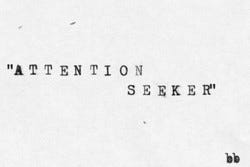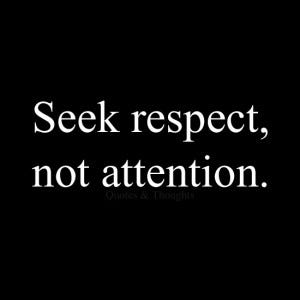Understanding Attention-Seeking Behavior in Relationships
Written on
Chapter 1: The Nature of Attention-Seeking
Is your partner displaying attention-seeking tendencies?

Attention-seeking actions, especially when they are extreme or dramatic, can be detrimental and often indicate deeper mental health issues, even if the individual is not consciously aware of their behavior. Over time, these habits can strain both romantic and platonic relationships, leading to feelings of control and imbalance.
It is essential to differentiate between simply receiving attention and actively seeking it. While receiving attention can provide feelings of acceptance, value, and validation, attention-seeking can lead others to feel compelled to engage when they may not genuinely wish to.
Recognizing that everyone has a basic need for attention is crucial. Human beings thrive on connections, which are fundamental to our survival. However, problems arise when these needs escalate to unhealthy levels.
Section 1.1: Exploring the Causes of Attention-Seeking
One significant factor contributing to attention-seeking behavior is past trauma. This may stem from childhood experiences or more recent painful events, such as difficult breakups. Coping with rejection can be challenging, but seeking validation from new acquaintances can place undue stress on them, leading to misconceptions about your intentions.
Subsection 1.1.1: The Strain of an Unbalanced Relationship
In relationships where one partner seeks constant attention, a significant imbalance often occurs. The attention seeker may continuously require affirmation without reciprocating emotional support. This dynamic can burden the other partner, forcing them into a role of constant cheerleader or emotional crutch.
Healthy relationships should involve open and constructive communication during challenging times. If you choose to disengage from the drama and stop responding to these demands, the attention seeker may escalate their behavior in an attempt to elicit a reaction from you.
You may have observed friends sharing vague posts on social media, such as:
"Feeling unwell"
Not everyone shares such posts for the same reasons. I recall a friend who, while sitting next to me at school, posted something similar. When I inquired about her well-being, she admitted she was trying to attract her boyfriend's attention. I was taken aback and asked her why she felt the need to do that.

Attention seekers often create drama on social media, deliberately posting cryptic messages to provoke concern and garner reactions. They may post ambiguous statements hinting at personal struggles, waiting for friends or followers to inquire about their situation.
Section 1.2: Solutions for Attention-Seeking Behavior
If you find yourself in the role of an attention seeker, I always recommend seeking therapy. Speaking to a professional can significantly aid in addressing and resolving these underlying issues. Therapists are equipped to help you unpack your thoughts and feelings, guiding you toward understanding the reasons behind your behavior and assisting you in modifying it.
Thank you for taking the time to read this.
Aisha|